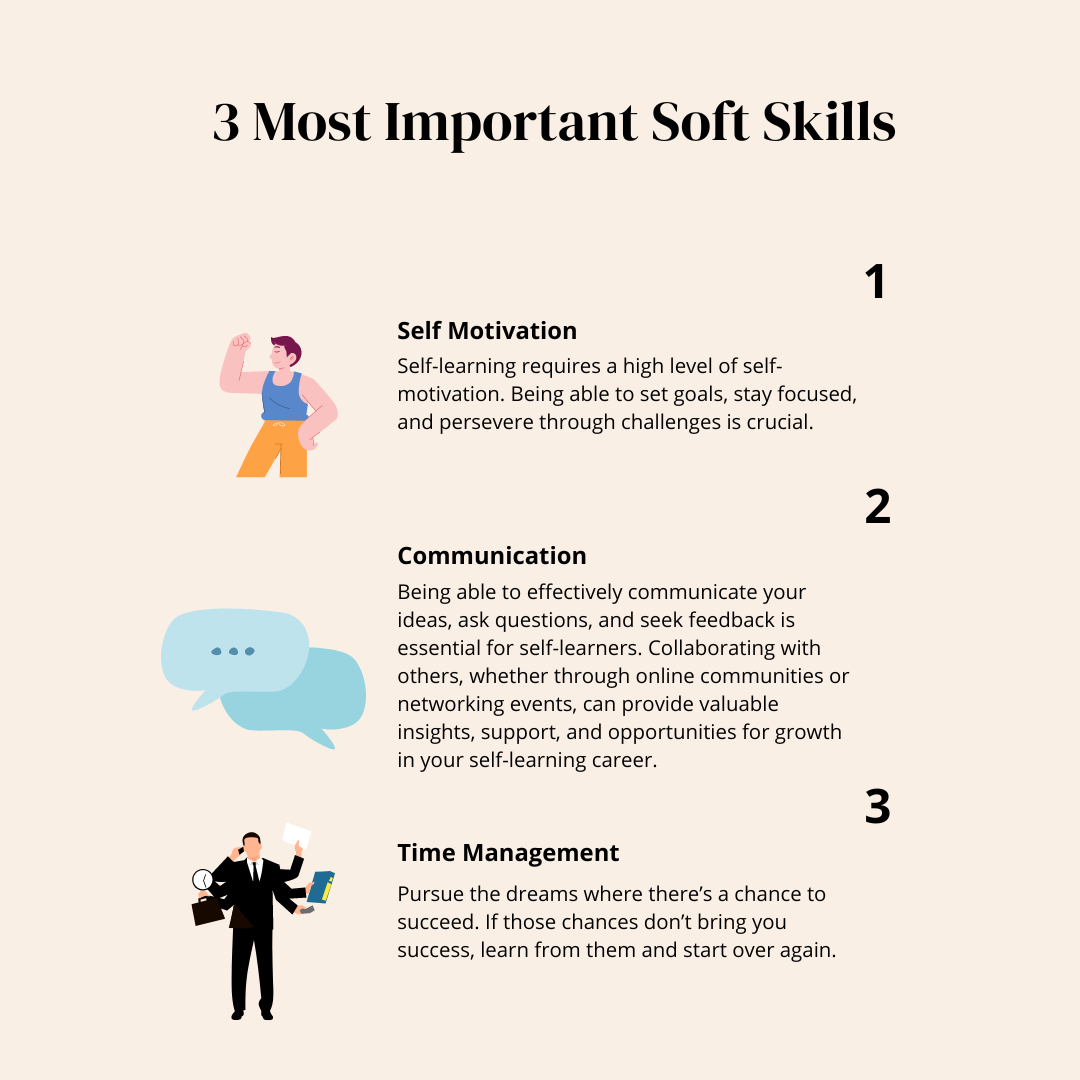
Table of Contents
- Alternative Paths to Success
- Navigating Your Career Path
- Learning and Progression
- Networking Beyond the Classroom
- The Entrepreneurial Spirit
- Overcoming Challenges and Staying Motivated
- Embracing Lifelong Learning
- Available Careers Without College
Key Findings
Diverse Pathways: The notion of college as the sole gateway to success is evolving. Apprenticeships, online certifications, and entrepreneurship are gaining traction as viable routes in fields beyond traditional academia.
Strategic Direction: Navigating a career without college requires focused planning. Absence of a clear strategy can lead to uncertainty and missed opportunities. A well-defined plan helps self-learners stay on track and avoid setbacks.
Entrepreneurial Exploration: Entrepreneurship offers a compelling avenue. It empowers individuals to carve their path, pursue passions, and reap personal and professional growth.
Networking's Power: Crafting a professional network is vital. Traditional institutions offer opportunities, but self-learners can tap into online communities, events, and social media to build valuable connections.
Practical Experience: Experience replaces a degree's prominence. Internships, freelancing, and volunteering showcase skills, offering tangible evidence of competence to potential employers.
Lifelong Learning: Lifelong learning is a linchpin. It keeps skills current and enables career growth. Dedication to self-improvement helps weather the ever-changing landscape.
Diverse Careers: Numerous rewarding roles don't require a degree. From medical records technicians to wind turbine technicians, alternative paths offer growth, impact, and skill development.
Success Beyond College: Success is achievable without a degree. Leveraging skills, networking, and personal growth opens doors to impactful careers, proving that the college path is only one route to achievement.
Exploring Alternative Paths to Success
While it is true that certain careers traditionally require a college degree, such as medicine, law, or engineering, there are many industries and professions where a college degree is not a strict requirement. In recent years, there has been a growing recognition of alternative paths to success, including apprenticeships, online certifications, and entrepreneurship. These avenues can provide valuable skills and knowledge that are relevant to specific industries or professions.
It’s important to acknowledge that not having a college degree may limit certain opportunities or make it more challenging to compete in highly competitive fields. Certain career paths may have stricter requirements for entry or advancement. However, the importance of a college degree is not universal across all industries or job roles. Skills, experience, networking, and a proactive approach to learning and personal development can also play significant roles in building a successful career without a college degree.
Navigating Your Career Path: Building a Plan for Success Without College
Keep in mind that, a lot of these soft skills like networking and communication are part of traditional university curriculums. But for a self-learner you would have to achieve all these skills on your own on top of your technical skills which college students are easily achieving by submitting their assignments on time.
The difficulty of pursuing a career without college depends on your chosen field, industry norms, the availability of alternative educational paths, your dedication to continuous learning, and your ability to demonstrate your skills and value to potential employers. If you are taking the self-learning route, it’s very important to know what you are doing and how you are investing your time. Without a proper plan you are more likely to get stuck in your journey and get overwhelmed at times. While it is okay to fail on your way to success, but it’s also important to not waste your time and effort on a dead-end path, because not only you are losing the time you spent on it but you’re also missing out on a better opportunity that you could have achieved with a proper career plan.
The journey of self-directed learning can sometimes lead to moments of demotivation, ultimately resulting in the abandonment of one's career aspirations. To combat this, we've crafted this comprehensive article, aimed at providing you with a framework to construct an effective career plan sans the traditional college route. Our goal is to help you organize your career trajectory, addressing the myriad of challenges that may come your way. By encompassing all the pivotal aspects of navigating a career without college, we aim to empower you to overcome obstacles and propel yourself towards a fulfilling professional journey.
Learning and Progression: The Foundation of a College-Free Career
Self-learning is the cornerstone of a successful career without a college degree. Embracing continuous learning, whether through online courses, tutorials, workshops, or hands-on experiences, empowers you to hone essential skills and stay updated with industry trends. Moreover, it showcases your dedication to growth and adaptability, qualities highly valued by employers.
Networking Beyond the Classroom: Building Relationships for Success
While traditional university environments foster networking opportunities, as a self-learner, you can forge connections through online forums, industry events, workshops, and social media. Cultivating a strong professional network opens doors to mentorship, collaboration, and potential job referrals.
Demonstrating Value Through Practical Experience
Without a degree, tangible experience becomes your currency. Seek internships, freelance projects, or volunteer opportunities in your chosen field to gain practical insights and showcase your abilities to potential employers. A robust portfolio speaks volumes about your skills and dedication.
The Entrepreneurial Spirit: Forging Your Path
Entrepreneurship offers a viable avenue for those without a college degree. From creating a startup to freelancing or consulting, leveraging your skills independently allows you to define your journey on your terms. The autonomy and creative control can lead to unparalleled personal and professional growth.
Overcoming Challenges and Staying Motivated
The path of self-learning isn't without challenges. Moments of doubt, setbacks, and the absence of a structured curriculum can be daunting. However, fostering a growth mindset, setting incremental goals, and celebrating small victories can help you maintain motivation and focus.
Embracing Lifelong Learning
A college degree is not the sole determinant of success. With dedication, strategic planning, continuous learning, networking, practical experience, and a resilient mindset, you can build a flourishing career in your chosen industry. The self-learning journey is one of exploration, adaptation, and self-discovery. By leveraging the resources available to you and carving your unique path, you have the potential to achieve your professional aspirations, regardless of whether or not a college degree is part of the equation.
Available Careers Without College
If you're considering a career path that doesn't necessitate a college degree, you're in luck. There are numerous fulfilling and financially rewarding roles available across various industries. Let's take a closer look at some of these careers:
1. Medical Records Technician
Medical records technicians play a critical role in maintaining and organizing patient health information. They ensure that medical records are accurate, complete, and securely stored. This role requires attention to detail, knowledge of medical terminology, and proficiency in electronic health record systems. Medical records technicians often work in hospitals, clinics, and other healthcare settings.
2. Wind Turbine Technician
As the demand for renewable energy sources grows, so does the need for skilled wind turbine technicians. These professionals are responsible for the installation, maintenance, and repair of wind turbines used to generate clean energy. Wind turbine technicians work at wind farms and play a crucial role in supporting sustainable energy production.
3. Community Health Worker
Community health workers bridge the gap between healthcare providers and the communities they serve. They educate individuals and groups about healthy behaviors, provide basic medical care, and connect people to healthcare services. Community health workers often work in underserved areas to improve health outcomes and promote wellness within the community.
These are just a few examples of careers that you can pursue without a college degree. Each of these roles offers unique opportunities for growth, skill development, and meaningful contributions to society. It's important to note that while a college degree might not be required for entry into these fields, continuous learning, hands-on experience, and staying updated with industry trends are crucial for advancement and success.
Building Bridges, Breaking Barriers: The Power of Communication Skills in IT
Communication SkillsMastering Time, Unleashing Productivity: The Key to Success in IT
Master Time Management

